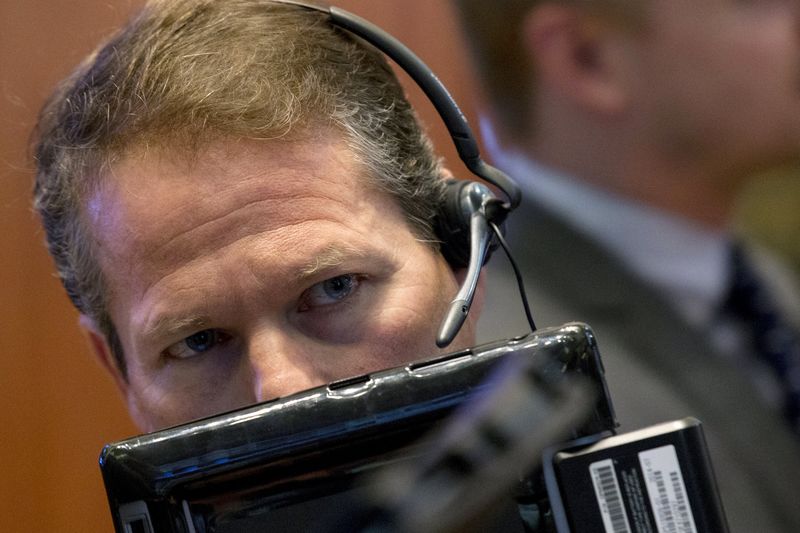* ECB weighs up new easing
* Several 2-year yields hit record lows
* ECB report overshadows Russia-Turkey tensions
By Jamie McGeever
LONDON, Nov 25 (Reuters) - The euro and euro zone bond yields sank on Wednesday after Reuters reported that central bank officials are weighing up how to ease monetary policy further in the coming weeks, including staggering charges on banks hoarding cash or buying more debt.
Two-year yields in Germany and France - already well below zero - plunged to new lows, the euro hit a seven-month trough and the rally in stocks moved up a gear. ID:nL8N13I42U
The widening gap between euro zone and U.S. yields helped propel the dollar to its highest level on a broad index basis since March, which pushed oil and commodity prices sharply lower.
These sweeping moves ahead of the European Central Bank's policy meeting next week overshadowed the reverberations of Turkey's shooting down of a Russian fighter jet this week, which had earlier somewhat tempered investors' risk appetite.
"The ECB leaks the bazooka?" said Josh O'Byrne, currency strategist at Citi in London.
"Following the very dovish speech from (ECB) President Mario Draghi last week targeting higher inflation as quickly as possible, an ECB overwhelm looks on the cards," he said.
The ECB meets on December 3 and is widely expected to loosen policy via a further cut in the deposit rate or extending and expanding its bond-buying stimulus to stave off the threat of deflation.
The two-year German yield fell to -0.41 percent EU2YT=RR and the two-year French yield to -0.33 percent FR2YT=RR . The gap between two-year U.S. and German yields moved out to 134 basis points, the widest spread in over nine years.
All German government bond yields out to seven years are now below zero.
The euro slid over a cent to a seven-month low of $1.0580 EUR= , and the dollar index against a basket of major currencies .DXY rose to an 8-month high of 100.07.
CRUDE AWAKENING
European stocks rallied further, and at 1210 GMT the FTSEuroFirst 300 index of leading shares was up 1.3 percent at 1,500 points .FTEU3 and Britain's FTSE 100 .FTSE was up 1 percent at 6,337 points.
Germany's DAX was up 1.5 percent at 11,097 points, almost doubling its gains after the euro zone central banks report.
U.S. stock futures pointed to a rise of around 0.2 percent at the open on Wall Street ESc1 , while earlier in Asia MSCI's index of Asia-Pacific stocks outside of Japan .MIAPJ0000PUS slipped a mere 0.05 percent.
The shooting down of the Russian warplane by Turkey on Tuesday was not too far from investors' minds, although they drew some comfort from the lack of escalation in tensions between Russia and Turkey on Wednesday.
"The geopolitical issue has rapidly lost its importance outside the Turkish borders as the risks of an escalating military interaction are very low at this stage," said Ipek Ozkardeskaya, strategist at London Capital Group.
Russia said on Wednesday it will send an advanced air defence system to reinforce its air base in Syria and consider cancelling a raft of joint business projects with Ankara after one of its warplanes was downed. urn:newsml:reuters.com:*:nL8N13K1M1
The news from Turkey briefly sparked oil supply fears and sent crude prices surging overnight to two-week highs. But the market slumped in Europe as the dollar rallied.
U.S. crude CLc1 and Brent crude LCOc1 futures fell around 2 percent to $42.09 and $45.16 a barrel, respectively.
Prices of metals such as zinc and copper resumed their recent downtrend as the dollar rallied. This makes dollar-denominated metals more expensive for buyers. MET/L
Industrial metals are seen remaining under pressure in the long run with an expected Federal Reserve interest rate hike in December likely to underpin the dollar.
In Britain the focus was on finance minister George Osborne's latest push to lower the country's budget deficit through a series of massive spending cuts. ID:nL8N13I3NN
This follows comments earlier this week from top Bank of England officials that added weight to the view that interest rates will be kept lower for longer.
"The fiscal squeeze is one reason the financial markets expect such a time lag between a (U.S.) Fed rate increase and an increase from the BOE," said Derek Halpenny, senior currency strategist at BTMU in London.
"If Osborne sticks to his guns the pound may well remain under downward pressure over the near-term."
Sterling was down slightly against the dollar at $1.5080 GBP= . (Editing by Richard Balmforth; To read Reuters Global Investing Blog click on http://blogs.reuters.com/globalinvesting; for the MacroScope Blog click on http://blogs.reuters.com/macroscope; for Hedge Fund Blog Hub click on http://blogs.reuters.com/hedgehub)
